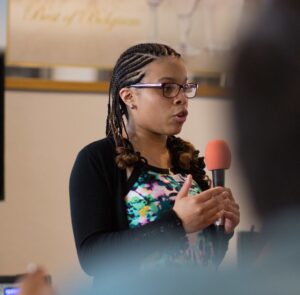Areas of Economics
Agriculture, Natural Resources, and the Environment
The economics of farming, fishery, forests, and natural resources with a focus on prices, markets, and changing technologies. Topics include the study of markets for energy (oil, coal, and electricity) and mineral resources, and policies to promote clean air, water, and land.
Professors’ Scholarship:
Liu: “Menu-dependent food choices and food waste”
Ruebeck: “Knowledge Spillover and Positive Environmental Externality in Agricultural Decision Making under Performance-Based Payment Programs”
Stifel: “A Green-Gray Path to Global Water Security and Sustainable Infrastructure.”
Economic Development
The study of why some countries have developed while others have not, with special focus on the world’s less developed countries. How might industrialized countries improve prospects for development around the world? Who gains and who loses under policies to help economies develop?
Professors’ Scholarship:
Hutchinson: “Fiscal Expenditure Policy and EconomicGrowth: Evidence from Latin America and the Caribbean”
Stifel: “Market Access, Well-Being, and Nutrition: Evidence from Ethiopia”
Economics of Race and Gender
This area of economics deals with allocation, welfare, and well-being and uses an economics disciplinary perspective to understand hierarchy, power, inequity, discrimination, and injustice. Microeconomics is a fundamentally outward-looking and interdisciplinary field that endeavors to answer this question by being both firmly grounded in economics and also deeply connected to sociology, psychology, political science, and law.
Professors’ Scholarship:
Averett: “Will daughters walk mom’s talk? The effects of maternal communication about sex on the sexual behavior of female adolescents.”
Rizvi: “Community-Based Digital Archives to Support Diversifying Campuses and Enhance Community Involvement”
Ruebeck: “The economics of identity and the endogeneity of race”
Financial Economics
Professors’ Scholarship:
Swidler: “Do equity-linked certificates of deposit have equity-like returns?”
Kelly: “CDO squareds: the case of subprime mortgagest”
Health and Education Economics
The study of determinants of educational attainment and health outcomes, and the impact of government policies on these outcomes.
Professors’ Scholarship:
Averett: “Residential Noise Exposure and Health: Evidence from Aviation Noise and Birth Outcomes”
Biener: “The impact of obesity on medical care costs and labor market outcomes in the US”
Larsen: “The Effects of the New Orleans Post-Katrina School Reforms on Student Academic Outcomes”
International Trade and Finance
The study of trade among nations and the flow of money and payments across international borders. Topics also include globalization and the balance of payments with other countries.
Professors’ Scholarship:
DeVault: “Economics and the international trade commission”
Ogrokhina: “The role of inflation targeting in international debt denomination in developing countries”
Macroeconomics and Monetary Economics
The study of the national economy and the determinants of national production, unemployment, and inflation. This field also examines the role of the Federal Reserve System, interest rates, and monetary and financial stability policy.
Professors’ Scholarship:
Guisinger: “A state-level analysis of Okun’s law”
Ogrokhina: “The Role of Inflation Targeting in Debt Denomination in Developing Countries”
Smith: “Are the Fed’s inflation forecasts still superior to the private sector’s?”
Mathematical and Quantitative Methods
Econometrics
Develops and uses statistical and mathematical tools to analyze economic issues and policy questions.
Professors’ Scholarship:
Guisinger: “Industrial Connectedness and Business Cycle Comovements”
Ogrokhina: “Can policy shifts explain the forward discount puzzle?”
Behavioral and Experimental Economics
Behavioral Economics
Integrates psychological insights about human behavior into economic theories.
Professors’ Scholarship:
Gómez-Miñambres and Liu: “Menu-dependent food choices and food waste”
Experimental Economics
Develops and uses experiments, typically with human subjects, to study economic issues and policy questions.
Professors’ Scholarship:
Gómez-Miñambres: “Emotional calibration of self-control”
Public Economics
The study of the role of government in the economy including how to evaluate government programs, the design of tax systems, and how the political process makes decisions.
Professors’ Scholarship:
Crain: “On the structure and stability of political markets”
Guisinger: “Economic Forecasting: Comparing the Fed with the Private Sector”
Swidler: “Government hedging: Motivation, implementation, and evaluation”
 Open to sophomore, junior, and senior full-time Lafayette students in all disciplines who maintain a 3.25 GPA or higher, the prestigious
Open to sophomore, junior, and senior full-time Lafayette students in all disciplines who maintain a 3.25 GPA or higher, the prestigious